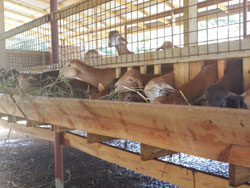 The Division of Agriculture, Marine Affairs, Marketing and the Environment has activated detailed protocols for the management of Caseous Lymphadenitis (CLA) which was discovered on the Studley Park and Blenheim Sheep Stations.
The Division of Agriculture, Marine Affairs, Marketing and the Environment has activated detailed protocols for the management of Caseous Lymphadenitis (CLA) which was discovered on the Studley Park and Blenheim Sheep Stations.
DAMME is now focused on containment and the eventual elimination of the disease among the population of sheep that are kept for breeding.
Veterinarians at the facility have advised that transmission from animal to animal generally occurs if there is direct contact with fluid from abscesses that contain the pseudotubercolosis bacteria. It should be noted that this bacteria has not been found in semen hence is unlikely to be sexually transmitted among the sheep that are kept for breeding.
CLA is not easily transmitted to humans; however precautions are being taken at the Studley Park Station, through the use of protective gloves and thorough sanitation when dealing with the affected animals. As a result, the Division is advising members of the public that there is no cause for alarm.
Vet Officer assigned to the Blenheim and Studley Park facilities, Dr. Gail St. Clair-Lowhar says “There is misinformation and rumours that the disease is of a cancerous nature and that sheep are dying, this is totally FALSE”. Dr. Lowhar says “no animal has died from this disease”.
At present, both Blenheim and Studley Park Sheep facilities have implemented strict bio-security protocols and continuous testing and are treating affected livestock to reduce transmission and prevent further spread.
Dr. Lowhar is advising members of the public that there is no need to panic as this is a routine disease found all over the world.
The Division also advises:
- That affected animals are isolated
- The movement of all sheep from the Sheep facilities are prohibited
- The affected sheep are isolated, pens and equipment are thoroughly cleaned and disinfected daily
- The wounds on the affected animals are treated with iodine
- Lambs weaned early and reared separately and this has proven effective in eliminating contamination
- Mandatory use of foot and drive baths have been implemented for use by all workers.
- And finally, there are restrictions to unauthorized movement of people and vehicles on the farm.
Prevention and Control
Prevention and control of the disease relies on the application of strict management and hygiene. These include:
- Maintaining a closed flock where possible.
- Purchase from flocks known to be C.L.A free.
- Quarantine newly introduced sheep for at least 4 months.
- Examination of those quarantined regularly.
The Division of Agriculture, Marine Affairs, Marketing and the Environment reiterates that it is working assiduously to ensure the quality and safety of livestock is maintained in Tobago.
Persons with further concerns can feel free to contact the Animal Health Unit at 660-2008 or the Corporate Communications Unit at 635-1612.
